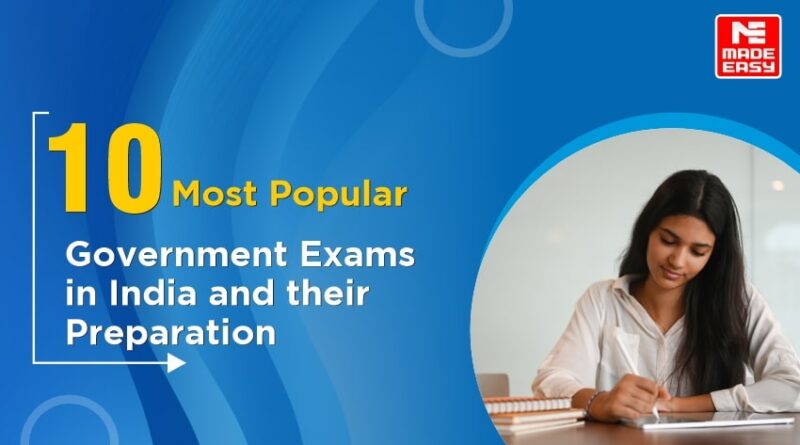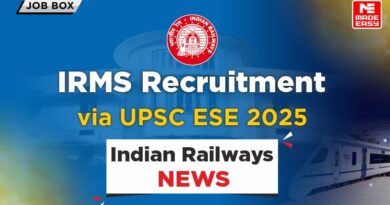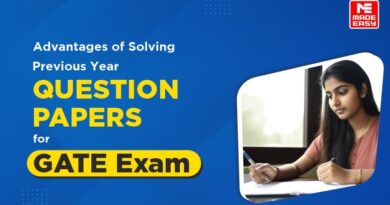10 most popular government exams in India and their preparation
Government jobs in India are the most prestigious jobs and many candidates dream of qualifying for it. As a government employee, one can expect better job stability and security, better career opportunities, professional growth, and financial stability. Not only this, one gets the perks and benefits along with the opportunity to contribute to the nation’s growth. Through this blog, will talk about some prominent government exams in India. Whether you are a recent graduate or someone who is looking to switch your career to the government sector, these popular exams can help you for professional growth and serve the nation.
The craze and competition of cracking the government jobs in India has been constantly increasing every year. Every year lakhs of candidates fill up the application and give their best to qualify the exams. The landscape of government jobs is vast and varied, having vacancies in central and state departments, public sector undertakings [PSUs], and other autonomous bodies. Candidates with educational qualifications ranging from high school to masters’ degree are eligible to work in various government sectors based on the profile.
Although the process of getting recruited is a rigorous process which goes through several stages. It involves conducting the exam tailored to the job profiles requirements, consisting of at least two stages: Tier I and Tier II, followed by interview sessions, document verification and medical examination [if needed]. All this process for the vacancies which are limited but have a maximum number of candidates. So the candidate has to work hard and prepare strategically in order to qualify for their dream job.
We’ll have a comprehensive understanding of some government exams which are popular among candidates, including engineering grads.
Most Popular Government exams in India
From the most challenging yet prestigious civil services exams offering post of IAS, IPS, IFS to a bank probationary officer or a railway engineer, each exam offers a stable and rewarding career. Every exam has different significance, eligibility criteria, exam pattern and a different approach. So a strategic preparation is required to help you succeed. Let’s delve into some popular exams ranging from officer level to junior engineer level.
Table of Contents
- UPSC Civil Services Exam (CSE)
- UPSC Engineering Services Examination (ESE)
- Graduate Aptitude Test in Engineering (GATE)
- Staff Selection Commission (SSC) Combined Graduate Level (CGL) Exam
- Institute of Banking Personnel Selection (IBPS)
- Railway Recruitment Board Junior Engineer (RRB JE)
- State Engineering Services (SES) Exam
- Staff Selection Commission Junior Engineer (SSC JE) Examination
- Indian Space Research Organisation (ISRO) Scientist/Engineer Examination
- Defence Research and Development Organisation (DRDO) Scientist Examination
- Why do you want a government job?
- Which book should be bought for government job preparation?
- FAQs
1. Union Public Service Commission [UPSC] Civil Services Exam
Union Public Service Commission (UPSC) conducts the most challenging yet prestigious Civil Services Exam. It is conducted annually to recruit candidates for the positions such as Indian Administrative Service (IAS), Indian Police Service (IPS), Indian Foreign Service (IFS), and other central services. These roles hold a significant authority and responsibilities in administration, law enforcement, and the diplomacy of the country. A candidate on any of these job profiles has excellent job security, handsome pay scale and various other perks and benefits.
Eligibility criteria:
- Must have a nationality of India.
- Age limit is between 21 years to 32 years.
- A bachelor’s degree
Exam Pattern:
- Preliminary Exam consists of objective type questions.
- Main Exam consists of subjective questions.
- Personality Test (interview)
Approach:
- Understanding the exam pattern and syllabus thoroughly
- Create a study plan
- Making notes
- Referring to reliable sources
- Practice answer writing
- Regular revision and mock test
- Staying updated with current affairs
2. UPSC Engineering Services Examination (ESE)
Known as Engineering Services Examination , ESE is conducted by UPSC annually to recruit engineers for various technical and managerial positions in the government sector. The roles and responsibilities of a qualifying candidate depends on the engineering branch and the department they are recruited. They take diverse roles such as project management, technical supervision, and infrastructure development for various government departments like railways, CPWD, telecommunication, Border Roads, CWC, CPES, NHAI, Naval Armaments, IDSE, MES, Ordnance Factories, etc.; however, they can move to any cadre, organization, agency, department, ministry, or PSU of the Government of India depending upon certain criteria and vacancies.
Eligibility criteria:
- Must be a citizen of India.
- Candidates must be between 21 and 30 years of age.
- A degree in engineering from a recognized university.
Exam Pattern:
- Preliminary exam consists of objective questions.
- The Main exam consists of descriptive questions.
- Personality exam (Interview)
Approach:
- Understanding the syllabus well is very important.
- Reliable study material and resources.
- Creating a realistic study plan.
- Focus on conceptual clarity.
- Practicing mock tests and regular revision.
- Practicing answer writing
- Stay updated on general knowledge and current affairs
3. Graduate Aptitude Test in Engineering (GATE)
GATE is an annual examination is a joint venture by the prestigious Indian Institute of Science (IISc) and seven Indian Institutes of Technology (IITs). Qualifying GATE examination offers engineering candidates eligibility to enroll for higher studies like M.Tech, M.E and direct PHD admission in institutes like IITs, NITs and other premier institutes, research opportunities and brilliant professional career in various PSUs of government.
Eligibility criteria:
- Indian nationality
- There is no age limit for appearing in the exam.
- Bachelor’s degree from a recognized university.
Exam Pattern:
- Objective questions including MCQs, MSQs and NAT.
- 65 questions and 100 marks in total
Approach:
- Thoroughly review the GATE syllabus.
- Well founded study material and resources.
- Structured study plan.
- Focus on understanding the fundamentals of GATE syllabus.
- Solving previous year questions and regular revision.
- Focusing equally on general aptitude and engineering mathematics.
4. Staff Selection Commission (SSC) Combined Graduate Level (CGL) Exam
SSC conducts CGL exam every year to recruit for various posts of Group B and Group C (non-gazetted) in government ministries, departments and organizations. There are diverse roles such as Assistant Audit Officer, Assistant Section Officer, Inspector of Income Tax, and Sub-Inspector, among others. The job offers job security and stability, attractive salary along with numerous perks and benefits.
Eligibility criteria:
- Must be a citizen of India.
- Age limit is between 18 to 32 years old.
- A bachelor’s degree from a recognized university.
Exam Pattern:
- Tier I is a computer based test [CBT]
- Tier II is also a computer based test [CBT]
- Tier III is a descriptive paper.
- Tier IV is a Data Entry Skill Test
Approach:
- Understanding the exam syllabus and pattern.
- Create a study plan.
- Reliable study material and sources
- Thorough practice of previous year question papers.
- Regular revision and mock test
- Improving english and quantitative aptitude
- Stay updated with general awareness
- Practice writing
5. Institute of Banking Personnel Selection (IBPS)
IBPS releases vacancies for various banking roles every year for the aspirants interested to join this sector. These exams are considered highly competitive and it includes responsibilities such as administration, clerical, and improving bank’s activities. IBPS Probationary Officer, IBPS clerk, IBPS specialist officer, IBPS Regional Rural Bank Officer etc are some major roles recruited through this exam.
Exam eligibility:
- A candidate must be an Indian citizen.
- Bachelor’s degree in any discipline.
- 20 to 30 years is the age limit for the roles.
Exam Pattern:
- Preliminary exam
- Main exam
- Personality test (interview)
Approach:
- Understand the syllabus well.
- Reliable study material and resources.
- Realistic study plan
- Regular revision
- Practicing previous year questions and mock tests.
- Stay updated on current awareness and general knowledge
6. Railway Recruitment Board Junior Engineer (RRB JE)
RRB conducts an exam to recruit junior engineers in Indian railways. Being a competitive exam, it also offers several perks and benefits. After a long wait, this year RRB has released vacancies for technical positions. The exam dates are supposed to be released soon. The junior engineers are responsible for maintenance and supervision of technical aspects for various departments.
Exam eligibility:
- Aspirants must be a citizen of India.
- Age limit is 18 to 33 years.
- Degree/ diploma holder in engineering from a recognized university.
Exam pattern:
- CBT stage 1
- CBT stage 2
- Medical examination and document verification
Approach:
- Thoroughly reviewing the RRB JE Syllabus
- Reliable study material and resources.
- Create and follow the study plan.
- Focusing on building a strong foundation.
- Practicing mock tests and regular revision is a must.
- Time management and accuracy while attempting the questions.
- Stay updated on latest current affairs and strong general knowledge.
- Focusing on core engineering disciplines.
7. State Engineering Services (SES) Exam
The State Engineering Services exam is conducted by state public service commissions to recruit for technical positions, especially engineers for state government departments. This exam offers candidates a stable government job with several perks and benefits with significant roles and responsibilities. SES engineers will be recruited in various departments such as PWDs, Water Resources, Irrigation Department, Municipal Corporation, etc.
Exam eligibility:
- Candidate must be a citizen of India.
- Age limit varies between 21 to 35 years.
- Bachelor’s degree in Engineering from a recognized university.
Exam pattern:
- Preliminary Exam consists of objective type questions
- Main Exam consists of descriptive questions
- The Personality Test is an interview round.
Approach:
- A detailed knowledge of syllabus including both the stages.
- Well rounded study material and resources.
- Developing and following a study plan.
- Focusing on fundamental concepts.
- Regular revision, practicing PYQs, and mock tests.
- Stay updated with the current affairs especially with the state you are applying from.
- Regular practice of technical concepts.
- Practice answer writing which should be detailed and well structured.
- Work on communication skills for the interview round.
Maharashtra Public Service Commission (MPSC) Engineering Services, Bihar Public Service Commission (BPSC) Assistant Engineer Exam, Uttar Pradesh Public Service Commission (UPPSC) Combined State Engineering Services, Rajasthan Public Service Commission (RPSC) Assistant Engineer Combined Competitive Examination, etc, are some different state engineering examinations.
8. Staff Selection Commission Junior Engineer (SSC JE) Examination
Staff Selection Commission conducts SSC JE exam to recruit engineers for various government departments and ministries. It is the most demanding exam among the engineering grads who are seeking a stable government job. The role of junior engineer is looking after the maintenance of infrastructure, supervision of electrical installments, maintaining the mechanical systems depending on the departments they are recruited in.
Exam eligibility:
- A candidate must be citizen of India
- The age limit is 18 to 32 years.
- Degree or diploma in engineering in relevant discipline Civil, Mechanical and Electrical.
Exam Pattern:
- Tier I (CBT)
- Tier II (CBT)
Approach:
- Thorough knowledge of both Tier I and Tier II syllabus.
- Use reliable study material and resources.
- Follow a realistic study plan.
- Regular revision.
- Practicing PYQs and attempting mock tests.
- Time management
- Latest current affairs and general knowledge.
9. Indian Space Research Organisation (ISRO) Scientist/Engineer Examination
ISRO conducts examinations to recruit scientists/engineers for various technical roles and responsibilities within the organization. This is a prestigious role and competitive as well, offering opportunities to engineering grads to work on space technology and research projects. Scientists/Engineers are responsible for the design, development, testing, implementation of space missions and projects.
Exam eligibility:
- A candidate must be a citizen of India.
- The upper age limit is 28 years.
- Bachelor’s degree in respective Engineering branch with first class with aggregate of 65% marks or CGPA 6.84/10.
Exam pattern:
- Written Test along with General Aptitude (Part A)
- Written Test along with General Aptitude (Part B)
- Interview
Approach:
- Thorough knowledge of ISRO scientist/engineer syllabus from the official notification.
- Reliable ISRO scientist/engineer study material and resources.
- Developing a realistic study plan and following it
- Understanding fundamental concepts.
- Practicing ISRO previous year questions and attempting mock tests.
- Regular revision is very important.
- Practice solving the questions within the given time accurately.
- Focus on technical concepts and practice them regularly.
- Improve your problem solving skills and critical thinking ability.
- Focus on communication skills as well as personality development.
Note: If you want to get detailed information about ISRO then click on the link given below:
👉🏻 All you need to know about ISRO
10. Defence Research and Development Organisation (DRDO) Scientist Examination
DRDO conducts examinations to recruit scientists for various technical roles and responsibilities within the organization. This prestigious role offers reputation with several perks and benefits. So the competition is very difficult, bringing opportunities for engineering grads and post- grads to work with advanced defense technologies. Scientist ‘B’ role is associated with research, design, development, testing, and evaluation of various technologies.
Exam eligibility:
- Indian nationality
- The age limit is 28 years.
- Bachelor’s degree in engineering in the relevant discipline with a valid GATE score.
Exam pattern:
- Paper 1 (written exam)
- Paper 2 (written exam)
- Interview
Approach:
- Know the thorough syllabus of DRDO from official job notification.
- Reliable study material and resources for DRDO scientist ‘B’.
- Follow structured study plan
- Strong fundamental concepts.
- Regular revision
- Practicing DRDO previous year questions and attempting mock tests.
- Time management and accuracy while attempting the questions.
- Regular practice of technical concepts.
- Improving logical reasoning, analytical skills, numerical skills and general awareness.
- Working on problem solving skills and communication skills.
Note: If you want to get detailed information about DRDO then click on the link given below:
👉🏻 All you need to know about DRDO
Above we have talked about the 10 most popular exams among the candidates, especially after graduation. But the list doesn’t end here, there are several popular government exams that candidates prefer attempting. Government exams in India are the most sought option to have a stable and secure job along with an opportunity to serve the nation. Here are list of other popular government exams:
- Bharat Electronics Limited (BEL) Probationary Engineer
- National Thermal Power Corporation (NTPC) Executive Trainee
- Power Grid Corporation of India Limited (PGCIL) Assistant Engineer Trainee
- Indian Oil Corporation Limited (IOCL) Graduate Engineers
- RBI Grade B Officer
- SSC CHSL (Staff Selection Commission Combined Higher Secondary Level)
- National Defence Academy (NDA)
- Combined Defence Services (CDS)
- NABARD Grade A and B Officer
- CTET (Central Teacher Eligibility Test)
- KVS (Kendriya Vidyalaya Sangathan) Teacher Recruitment
- Delhi Subordinate Services Selection Board (DSSSB) Exam
- Central Bureau of Investigation (CBI) Recruitment Exam
- Bharat Heavy Electricals Limited (BHEL) Recruitment Exam
The above-mentioned exams cover various fields from engineering, to defense, public sector undertaking (PSUs), administrative services and others, providing numerous perks and benefits of qualifying a government exam. And so the list of government exams is longer. Further we’ll talk about the benefits of government jobs.
Why do you want a government job?
Many candidates choose to work in government jobs because it offers great job opportunities, good salaries, and several perks and benefits. From work life balance, to various roles along with the opportunity to contribute to the nation’s growth. Here are some key reasons why anyone opt for a government job:
- Job security
- Attractive salary and perks
- Fixed working hours and paid holidays and leaves
- Professional growth and opportunity
- Social reputation
- Diverse job opportunities
- Social security
- Contribution for nation’s growth
Which book should be bought for government job preparation?
As we have mentioned, reliable study material for competitive exams is one of the important approaches. MADE EASY Publications team have qualified and experts in Civil and Engineering services who are being supported by the technical team to provide high quality reading material and learning solutions across a wide range of disciplines. Our book ranges from civil services to state engineering services books. We also recognize the language barriers faced by Hindi medium students preparing for CSE. And to ensure that students have access to quality reading material, our CSE books are available in Hindi medium.
| Book Name | About | Book Links |
|---|---|---|
| CSE 2025: विज्ञान और प्रौद्योगिकी (हिंदी) | Cover all essential topics and current developments in Science and Technology | Civil Services Exam 2025: Vigyan aur Prodyogiki (Hindi) |
| CSE 2025: स्वतंत्र भारत का इतिहास (हिन्दी) | Cover all essential events in India after independence. | Civil Services Exam 2025: Swatantrata ke Paschat Bharat ka Itihas (Hindi) |
| CSE 2025: सामान्य विज्ञान (हिन्दी) | Covers all the subjects of Biology, Physics, and Chemistry in a very clear and comprehensive manner. | Civil Services Exam 2025: Samanya Vigyan (Hindi) |
| CSE 2025: प्राचीन भारत का इतिहास (हिन्दी) | Covers concise material on Ancient India. | Civil Services Exam 2025: Prachin Bharat ka Itihash (Hindi) |
| CSE 2025: मध्यकालीन भारत का इतिहास (हिन्दी) | The book is a compilation of all important events, states, and dynasties of Medieval India. | Civil Services Exam 2025: Madhyakalin Bharat Ka Itihash (Hindi) |
| CSE 2025: भारतीय समाज (हिन्दी) | Covers foundational aspects of Indian society. | Civil Services Exam 2025: Bhartiya Samaj (Hindi) |
| CSE 2025: भारत की राज्यव्यवस्था (हिन्दी) | The book is all about India’s political system. | Civil Services Exam 2025: Bharat Ki Rajyavyavastha (Hindi) |
| GATE-2025: Civil Engineering | Previous Year Solved Papers comprise the previous years’ questions until the last GATE session. | GATE-2025: Civil Engineering Previous Year Solved Papers |
| GATE-2025: Electrical Engineering | Previous Year Solved Papers comprise the previous years’ questions until the last GATE session. | GATE-2025: Electrical Engineering Previous Year Solved Papers |
| GATE-2025: Electronics Engineering | Previous Year Solved Papers comprise the previous years’ questions until the last GATE session. | GATE-2025: Electronics Engineering Previous Year Solved Papers |
| GATE-2025: Computer Science and IT | Previous Year Solved Papers comprise the previous years’ questions until the last GATE session. | GATE-2025: Computer Science and IT Previous Year Solved Papers |
| GATE-2025: Mechanical Engineering | Previous Year Solved Papers comprise the previous years’ questions until the last GATE session. | GATE-2025: Mechanical Engineering Previous Year Solved Papers |
| ESE 2025: Preliminary Exam: Civil Engineering | Covers questions from the last 25 years of ESE. | ESE 2025: Preliminary Exam: Civil Engineering Objective Solved Paper Vol-1 |
| ESE 2025: Preliminary Exam: Mechanical Engineering | Covers questions from the last 25 years of ESE. | ESE 2025: Preliminary Exam: Mechanical Engineering Objective Solved Paper Vol-1 |
| ESE 2025: Preliminary Exam: Electrical Engineering | Covers questions from the last 25 years of ESE. | ESE 2025: Preliminary Exam: Electrical Engineering Objective Solved Paper Vol-1 |
| ESE 2025: Preliminary Exam: Electronics and Telecom. Engineering | Covers questions from the last 25 years of ESE. | ESE 2025: Preliminary Exam: Electronics and Telecom. Engineering Objective Solved Paper Vol-1 |
| RRB JE CBT-1 | Comprehensive theory with solved examples and practice sets | RRB JE CBT-1: Mathematics, General Intelligence |
| RRB JE CBT-1 | Comprehensive theory with practice questions | RRB JE CBT-1: General Awareness, General Science |
| State Engineering Services Books (MPSC, UPPSC, RSSB, BPSC etc.) | Books for state engineering exams | SES |
| DRDO, ISRO : Mechanical Engg. | Consists of previous year question paper | DRDO, ISRO : Mechanical Engg. Prev Sol Papers |
| DRDO ISRO : Electronics Engg. | Consists of previous year question paper | DRDO ISRO : Electronics Engg: Prev Sol. Papers |
Click down below the link to explore more high quality and reliable study material.
FAQs:
1. Which is the most popular government exam in India?
Ans. UPSC CSE is the most popular government exam in India.
2. What are the top 10 toughest exams in India?
- UPSC
- IIT JEE
- NDA
- UGC-NET
- Indian Engineering Services (IES)
- CLAT (Common Law Admission Test)
- Chartered Accountant (CA) Exam
- NEET
- CAT: Common Admission Test
- GATE: Graduate Aptitude Test in Engineering
3. Which exam is best for a government job?
Ans. UPSC CSE, SSC CGL, banking exams, and railway exams are the most in-demand exams for government jobs among students.
4. Which is the No. 1 government service in India?
Ans. Indian Administrative Services (IAS) is the No. 1 government service in India.
5. What are the top 3 All India Services?
Ans. Indian Administrative Service (IAS), the Indian Police Service (IPS), and the Indian Forest Service (IFS) are the top 3 All India Services
6. What are the top 5 civil services in India?
Ans. IAS (Indian Administrative Service), IPS (Indian Police Service), IFS (Indian Foreign Service), IRTS (Indian Railway Traffic Service), and IRS are the top 5 civil services in India.
7. Which job is equal to IAS?
Ans. Indian Administrative Services (IAS) is the most powerful and authoritative job, and there is no job equal to IAS.
8. Which coaching should I take to prepare for the exam?
Ans. Coaching that focuses on providing quality lectures by experts and giving strong support to the students in their preparation journey is considered ideal coaching. MADE EASY has been preparing students for highly competitive exams such as GATE, ESE, SSC JE, and SES and providing study material for exams like ISRO, DRDO, and RRB JE. Click on the link to know more: MADE EASY
Dear Aspirants,
Your preparation for GATE, ESE, PSUs, and AE/JE is now smarter than ever — thanks to the MADE EASY YouTube channel.
This is not just a channel, but a complete strategy for success, where you get toppers strategies, PYQ–GTQ discussions, current affairs updates, and important job-related information, all delivered by the country’s best teachers and industry experts.
If you also want to stay one step ahead in the race to success, subscribe to MADE EASY on YouTube and stay connected with us on social media.
MADE EASY — where preparation happens with confidence.

MADE EASY is a well-organized institute, complete in all aspects, and provides quality guidance for both written and personality tests. MADE EASY has produced top-ranked students in ESE, GATE, and various public sector exams. The publishing team regularly writes exam-related blogs based on conversations with the faculty, helping students prepare effectively for their exams.




